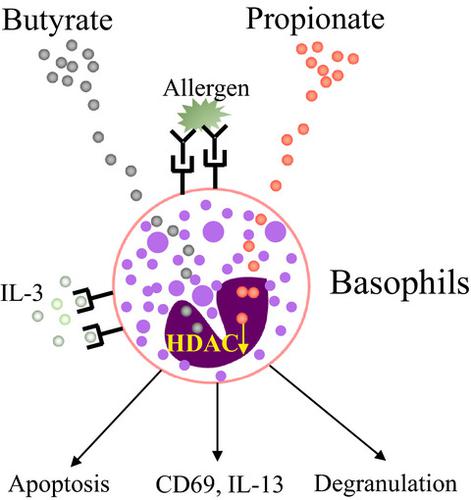当前位置:
X-MOL 学术
›
Immunology
›
论文详情
Our official English website, www.x-mol.net, welcomes your
feedback! (Note: you will need to create a separate account there.)
Induction of the apoptosis, degranulation and IL-13 production of human basophils by butyrate and propionate via suppression of histone deacetylation
Immunology ( IF 4.9 ) Pub Date : 2021-05-17 , DOI: 10.1111/imm.13370 Yanbiao Shi 1, 2 , Meizhen Xu 1, 2 , Shuai Pan 1, 2 , Sijia Gao 1, 2 , Jinfeng Ren 1, 2 , Ruixue Bai 1, 2 , Hui Li 1, 2 , Cheng He 1, 2 , Shuli Zhao 3 , Zhixu Shi 4 , Fang Yu 5 , Zou Xiang 6 , Hui Wang 1, 2
Immunology ( IF 4.9 ) Pub Date : 2021-05-17 , DOI: 10.1111/imm.13370 Yanbiao Shi 1, 2 , Meizhen Xu 1, 2 , Shuai Pan 1, 2 , Sijia Gao 1, 2 , Jinfeng Ren 1, 2 , Ruixue Bai 1, 2 , Hui Li 1, 2 , Cheng He 1, 2 , Shuli Zhao 3 , Zhixu Shi 4 , Fang Yu 5 , Zou Xiang 6 , Hui Wang 1, 2
Affiliation

|
Allergic diseases are caused by dysregulated Th2 immune responses involving multiple effector cells including basophils. Short chain fatty acids (SCFAs), mainly acetate, propionate and butyrate, exert immunomodulatory functions via activation of its receptors GPR41 and GPR43, and inhibition of the histone deacetylases (HDACs) activity. In allergic diseases, SCFAs suppress the activity of mast cells, eosinophils and type 2 innate lymphoid cells (ILC2) but enhance the function of Th2 cells. Here, we aimed to elucidate the function of SCFAs on human basophils. Human basophils were purified from healthy donors by flow cytometric sorting. The surface proteins, apoptosis and degranulation of basophils were analyzed by flow cytometric analysis. The mRNA expression was assayed using real-time PCR. Interleukin 4 (IL-4) and IL-13 were measured by ELISA. Histone acetylation was examined by western blot. GPR41 was expressed by basophils and was enhanced by IL-3. Acetate induced intracellular calcium influx in basophils which was suppressed by blocking GPR41. Propionate and butyrate, but not acetate, induced the expression of CD69 and IL-13. In addition, propionate and butyrate enhanced IgE-mediated basophil degranulation but inhibited basophil survival and IL-4 secretion. Propionate and butyrate induced histone acetylation of basophils and suppression of HDACs activity mimicked the effects of propionate and butyrate on human basophils. Our findings demonstrate that propionate and butyrate may play a complex role in regulating basophil apoptosis, activation and degranulation via inhibiting HDACs activity. The in vivo effects of SCFAs on the regulation of basophil-associated allergic diseases need to be further explored.
中文翻译:

丁酸盐和丙酸盐通过抑制组蛋白脱乙酰化诱导人嗜碱性粒细胞凋亡、脱颗粒和 IL-13 产生
过敏性疾病是由涉及包括嗜碱性粒细胞在内的多种效应细胞的 Th2 免疫反应失调引起的。短链脂肪酸 (SCFA),主要是乙酸盐、丙酸盐和丁酸盐,通过激活其受体 GPR41 和 GPR43 以及抑制组蛋白脱乙酰酶 (HDAC) 活性来发挥免疫调节功能。在过敏性疾病中,SCFA 会抑制肥大细胞、嗜酸性粒细胞和 2 型先天淋巴细胞 (ILC2) 的活性,但会增强 Th2 细胞的功能。在这里,我们的目的是阐明 SCFA 对人类嗜碱性粒细胞的功能。通过流式细胞术分选从健康供体中纯化人嗜碱性粒细胞。通过流式细胞术分析嗜碱性粒细胞的表面蛋白、凋亡和脱颗粒。使用实时PCR测定mRNA表达。通过 ELISA 测定白细胞介素 4 (IL-4) 和 IL-13。通过蛋白质印迹检查组蛋白乙酰化。GPR41 由嗜碱性粒细胞表达并被 IL-3 增强。乙酸诱导嗜碱性粒细胞内钙内流,阻断 GPR41 可以抑制钙内流。丙酸盐和丁酸盐(但不是乙酸盐)诱导 CD69 和 IL-13 的表达。此外,丙酸盐和丁酸盐增强了 IgE 介导的嗜碱性粒细胞脱颗粒,但抑制嗜碱性粒细胞存活和 IL-4 分泌。丙酸和丁酸诱导嗜碱性粒细胞的组蛋白乙酰化并抑制 HDAC 活性,模拟了丙酸和丁酸对人类嗜碱性粒细胞的影响。我们的研究结果表明,丙酸和丁酸可能通过抑制 HDAC 活性在调节嗜碱性粒细胞凋亡、活化和脱颗粒中发挥复杂的作用。SCFA 对调节嗜碱性粒细胞相关过敏性疾病的体内作用需要进一步探讨。
更新日期:2021-05-17
中文翻译:

丁酸盐和丙酸盐通过抑制组蛋白脱乙酰化诱导人嗜碱性粒细胞凋亡、脱颗粒和 IL-13 产生
过敏性疾病是由涉及包括嗜碱性粒细胞在内的多种效应细胞的 Th2 免疫反应失调引起的。短链脂肪酸 (SCFA),主要是乙酸盐、丙酸盐和丁酸盐,通过激活其受体 GPR41 和 GPR43 以及抑制组蛋白脱乙酰酶 (HDAC) 活性来发挥免疫调节功能。在过敏性疾病中,SCFA 会抑制肥大细胞、嗜酸性粒细胞和 2 型先天淋巴细胞 (ILC2) 的活性,但会增强 Th2 细胞的功能。在这里,我们的目的是阐明 SCFA 对人类嗜碱性粒细胞的功能。通过流式细胞术分选从健康供体中纯化人嗜碱性粒细胞。通过流式细胞术分析嗜碱性粒细胞的表面蛋白、凋亡和脱颗粒。使用实时PCR测定mRNA表达。通过 ELISA 测定白细胞介素 4 (IL-4) 和 IL-13。通过蛋白质印迹检查组蛋白乙酰化。GPR41 由嗜碱性粒细胞表达并被 IL-3 增强。乙酸诱导嗜碱性粒细胞内钙内流,阻断 GPR41 可以抑制钙内流。丙酸盐和丁酸盐(但不是乙酸盐)诱导 CD69 和 IL-13 的表达。此外,丙酸盐和丁酸盐增强了 IgE 介导的嗜碱性粒细胞脱颗粒,但抑制嗜碱性粒细胞存活和 IL-4 分泌。丙酸和丁酸诱导嗜碱性粒细胞的组蛋白乙酰化并抑制 HDAC 活性,模拟了丙酸和丁酸对人类嗜碱性粒细胞的影响。我们的研究结果表明,丙酸和丁酸可能通过抑制 HDAC 活性在调节嗜碱性粒细胞凋亡、活化和脱颗粒中发挥复杂的作用。SCFA 对调节嗜碱性粒细胞相关过敏性疾病的体内作用需要进一步探讨。











































 京公网安备 11010802027423号
京公网安备 11010802027423号